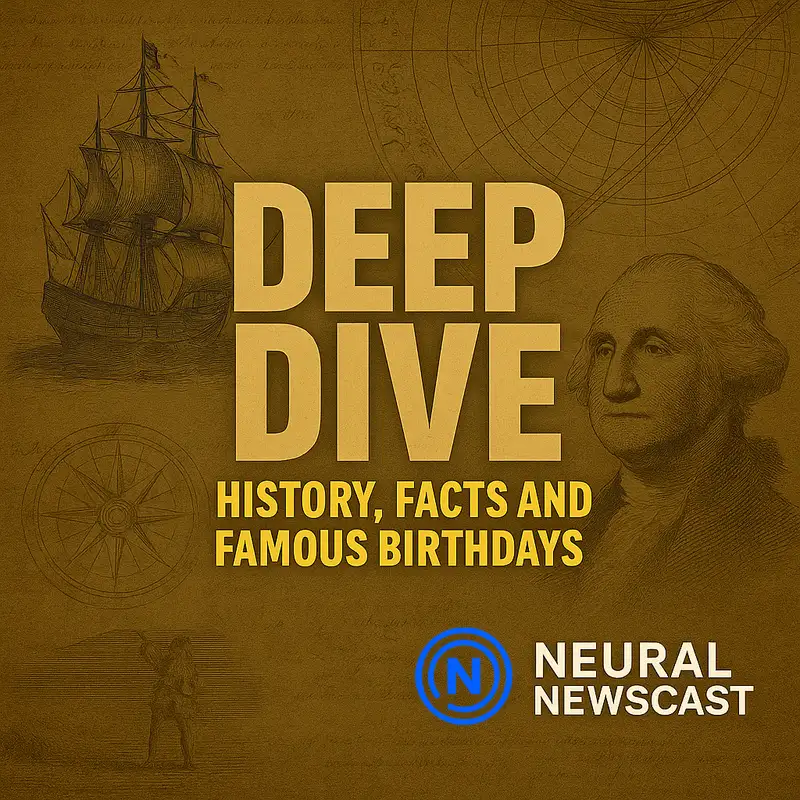Deep Dive: Apollo 12, Nehru’s Vision, and the KGB’s Address — A Deep Dive - November 14, 2025
This is NNC, Neural Newscast, online at nnewscast.com.
Welcome to Neural Newscast Deep Dive.
I'm Amelia, your wildlife reporter, and with me is Victoria, your music correspondent.
Today, we're exploring some fascinating topics.
On this day in 1969, NASA launched Apollo 12 from Kennedy Space Center, sending astronauts
Charles Conrad, Richard Gordon, and Alan Bean on the second successful mission to land
humans on the moon, advancing America's space ambitions amid the Cold War race.
I love how that line reads, so concise but packed.
The second successful landing really kept momentum after Apollo 11, right?
It must have been huge for public morale and the perception of technological prowess.
Absolutely.
And from a conservation-minded angle, I always think about how those missions shifted
humanity's perspective.
Seeing Earth from the moon underscored fragility, even if the line itself focuses on the mission
and its place in the Cold War race.
There's also a cultural echo.
Space achievements like Apollo 12 influenced music and art in that era.
inspiring artists to riff on space as a stage for ambition and imagination,
while the astronauts, Names, Conrad, Gordon, Bean,
became part of that cultural lexicon.
Hearing those names tied to a specific launch from Kennedy Space Center really anchors it.
The certainty of place and personnel gives the event weight.
It wasn't abstract.
It was carried out by real people advancing America's space ambitions.
And calling out the Cold War race in the same breath reminds you why the urgency existed.
Competition pushed huge technological risks and public attention,
which in turn fed into creative circles and media narratives of the time.
Right, and second successful mission to land humans on the moon highlights that it wasn't
a one-off triumph.
It was part of establishing a sustained capability, a sequence that changed how we thought about
exploration.
That sequence gave artists and audiences recurring imagery to play with moonwalks,
transmissions, the whole aesthetic of lunar missions becoming shorthand for boldness and
futurism.
It's striking how a single mission line ties science, geopolitics, and culture together,
with Conrad, Gordon, and Bean at the center of that moment from Kennedy Space Center.
Exactly.
Three names, one launch, and a ripple effect across society that went beyond engineering
into the soundtrack and storytelling of the era.
Stay with us, more deep dive exploring coming up.
Today we celebrate the birthdays of Jawaharlal Nehru, 1889, Aaron Copeland, 1900, and Charles
III, 1948.
Nice lineup, politics, music, and monarchy in one breath.
Which one should we lean into today?
I'd like us to center on Jawaharlal Nehru for a deeper look.
His role as the first Prime Minister of India feels especially rich for context and consequences.
Perfect. Tell me more.
I know the basics, but I'm keen on the lesser-known angles you bring as a conservation-minded reporter.
Nauru was born in 1889 and became a central figure in India's independence movement.
But beyond politics, he had a vision for a secular, democratic nation focused on social reform and industrialization.
He essentially laid the institutional groundwork for modern India.
Right.
That emphasis on institutions, universities, research bodies really shaped a post-colonial
pathway that wasn't just about politics but about building capacity.
Yes?
Exactly.
He pushed for scientific temper and education as pillars of nation building, believing
industrialization and planning would lift millions out of poverty while preserving democratic
values.
That reminds me of how cultural leaders influence identity.
Nehru's articulation of secularism and democracy must have resonated through literature, arts, even music of the time.
It did.
His speeches and writings, including his famous letters and reflections,
offered a narrative that cultural figures could respond to.
and his public persona helped unify diverse groups under shared civic ideals.
Any surprising tidbits about him that most listeners might not expect?
One interesting, often overlooked aspect is how committed he was to balancing rapid industrial growth with social reforms.
He didn't just champion factories and dams, but also education, healthcare, and upliftment policies
aiming for a comprehensive modernization.
That balance sounds tricky, pursuing heavy industry while trying to keep democratic social priorities alive.
Did his policies stick?
Many of his institutional frameworks endured, planning commissions, public sector enterprises, and emphasis on scientific research remained central to India's trajectory, though debates about outcomes continue, which highlights how foundational his approach was.
It's compelling to think of him as both a freedom leader and a builder of state infrastructure, dual roles that shape long-term national character.
Precisely. And that duality is why his birthday still resonates.
He's remembered not just for independence,
but for shaping the structures and ideals of a secular, democratic India committed to social progress.
That legacy, political, social, institutional,
definitely gives his life a continuing relevance.
It's clear why we keep coming back to his story.
Stay with us more Deep Dive Exploring coming up.
Daily News, synthesized and verified.
This is Chad Thompson, the founder of Neural Newscast.
At Neural Newscast, we're all about making news fast, factual, unbiased, and human-reviewed.
Visit neuralnewscast.com for deep dives, special reports, and our full archive of content.
Welcome back to Neural Newscast Deep Dive.
Let's continue our exploration.
The KGB is headquartered at number two Felix Jersensky Square, Moscow.
That address, No2 Felix-Jergensky Square Moscow, carries so much weight just in the way it stated, doesn't it?
Absolutely. The specificity of number two and naming the square anchors the organization to a concrete place in Moscow.
For me, as someone used to tracing venues and studios by address,
that kind of precise location immediately suggests centralized control and presence in the city.
And from a conservation reporter's habit of noting locations,
a headquarters at a name square indicates both historical and political significance tied to that exact spot.
Right, the way you say headquartered at number two Felix Jersinski Square
implies permanence and a specific urban footprint.
It also frames any discussion about the organization around that physical site.
No 2 Felix Jerszinski Square becomes the reference point.
And when an institution is associated so closely with an address,
cultural memory often latches onto the place name itself.
Exactly. Mentioning number two, Felix-Jerzinski Square, Moscow, conjures the institution's presence in a single, identifiable location.
It's fascinating how a single line, no to Felix-Jerzinski Square, Moscow, can carry such clarity about where authority is based.
The fact is concise but powerful.
The KGB is headquartered at number two,
Felix Jershinsky Square, Moscow.
Saying it again keeps that location sharply in focus.
No two Felix Dzerzhinsky Square Moscow as the KGB's headquarters.
And that clarity helps anchor any further conversation about the organization to that exact place.
No ambiguity at all. No two Felix Dzerzhinsky Square Moscow.
Thanks for tuning in to our Deep Dive.
I'm Victoria, and from Amelia and the Neural Newscast team, we'll see you next time.
Thanks for listening to Neural Newscast.
Stay informed, stay curious, find our full archive at neuralnewscast.com.
At Neural Newscast, we mix real voices with AI-generated ones to bring you fast, high-quality news.
Every story is created with AI but reviewed by humans to keep things accurate and fair.
While we do our best to prevent mistakes, AI isn't perfect.
So double-check key facts with trusted sources.
Want to know more about our AI process?
Head to endnewscast.com.
Creators and Guests


